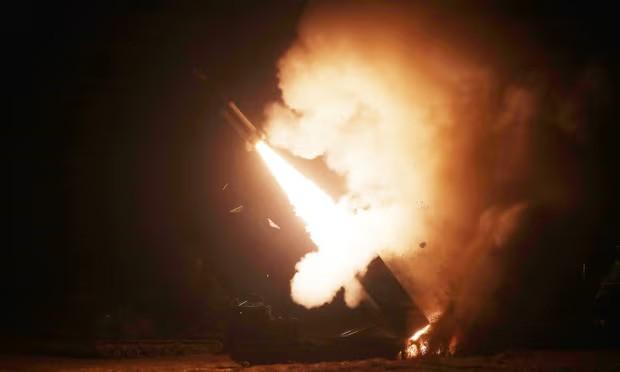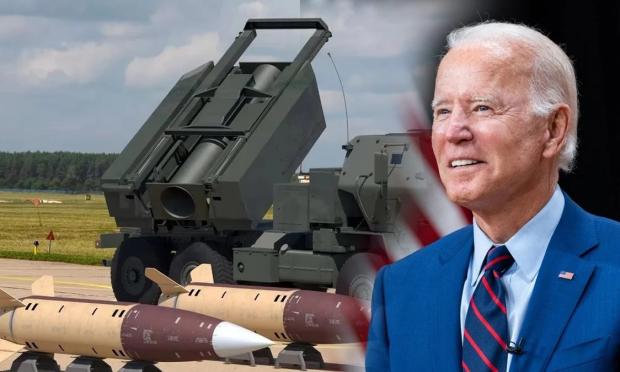Severe criticism of outgoing President Joe Biden for his decision to greenlight the use of long-range missiles by Ukraine against Russian targets is being unleashed by allies and associates of the next occupant of the White House, Donald Trump.
Key Trump supporters, including his son Donald Trump Jr., hardline Republicans in Congress, and other allies, are openly accusing Biden of seeking to ignite "World War III" before Trump's inauguration in January.
"The Military-Industrial Complex seems determined to ensure World War III starts before my father has the chance to make peace and save lives," wrote Donald Trump Jr. on X, as reported by Guardian.
Richard Grenell, former Deputy Director of National Intelligence during Trump’s first term, who was considered a potential candidate for Secretary of State, wrote: "No one expected Joe Biden to escalate the war in Ukraine during the transition period. It's like starting an entirely new war. Everything has changed now – all previous calculations are invalid."
Other Republicans argue, "Joe Biden has just set the stage for World War III. Let’s all pray we don’t reach that point."

State Department on Biden's decision
State Department spokesperson Matthew Miller defended the decision during a press briefing on Monday (18/11): "The American people elected Joe Biden for a four-year term, not for a three-year and ten-month term, and we will use every day of our term to pursue foreign policy interests we believe are in the best interest of the American people."
The ATACMS dilemma for Trump
Discussions had been ongoing for months between the White House, the State Department, and European allies regarding whether the use of ATACMS should be allowed. Currently, the decision to permit limited strikes using them will allow the Ukrainian army to target Russian military infrastructure in the Kursk region, where the U.S. has stated that over 10,000 North Korean soldiers have joined Russian forces preparing for a counteroffensive to expel Ukrainian troops from the area.
Trump's dilemma
The White House's decision puts the incoming administration in a dilemma regarding whether it will immediately revoke authorization for the use of ATACMS after Trump's inauguration or keep it as a potential bargaining chip in negotiations the elected president has stated he wants to pursue to end the fighting.
While Trump and his allies have condemned the increase in military support and economic aid to the Ukrainian government, analysts said it remains unclear whether Trump will immediately move to reverse the decision on the long-range missiles.
Trump's potential reversal of ATACMS authorization
Mark Cancian, a senior adviser at the Center for Strategic and International Studies, suggested that Trump could announce the suspension of the ATACMS authorization on his first day in office, pending a review of U.S. policy on Ukraine. However, he also warned that such a move could lead to heavy criticism and fuel narratives about possible agreements with Putin. Cancian emphasized that it is not certain that Trump would immediately revoke the decision, pointing out that the political cost of such a reversal might not be worth the potential gains. Additionally, as a negotiator, Trump might avoid starting with a concession, seeing it as bad negotiating strategy.
Implications of US approval for Ukraine
With Trump's presidency approaching, Ukraine urgently needs to demonstrate its effectiveness on the battlefield with Western support. According to Matthew Saville of the Royal United Services Institute, Ukraine must prove to the incoming U.S. administration that it remains a worthy investment in the context of Trump's transactional approach to foreign policy.
Despite the potential benefits of ATACMS authorization, many experts doubt that its broader use inside Russia would have a decisive military impact. Even if the U.K., France, and Italy agree to provide Ukraine with Storm Shadow/Scalp missiles (with similar range), the missile stocks are limited, and only the U.S. and European nations can provide the necessary guidance systems.
Ukraine's ongoing pressure
Meanwhile, Ukraine remains under significant pressure in the east, with Russian forces threatening to encircle Kurakhove in the south. Despite record Russian casualties, estimated at 1,500 per day, as the Kremlin continues to push for Trump's eventual victory, Ukraine faces its own challenges. In addition to ongoing shortages, it is likely that Russian forces will relocate vulnerable military assets to safer positions before Ukraine's long-range missile strikes can target them.
Why the White House changed its stance
The shift in the White House's stance came after months of intense pressure from Kyiv, with Biden initially reluctant to grant the request. The Biden administration had to weigh the practical utility of long-range strikes against the potential for collateral damage in NATO member states if Russia felt compelled to retaliate. Therefore, the decision was not as simple or obvious as some had suggested.
The situation changed when the deployment of North Korean troops in Kursk was seen as a significant escalation by the U.S. This development was viewed as Russia's attempt to globalize the war. In Biden’s view, authorizing long-range strikes was a response to this escalation. However, the delay in making this decision gave extra weight to the significance of the authorization.
The next steps for European allies
The White House's decision could also prompt European allies to follow suit. The UK is expected to supply Storm Shadow missiles for use by Ukraine in striking Russian targets, with Prime Minister Keir Starmer stating at the G20 summit that the UK should "double down" on its support for Ukraine.
Germany, however, maintained its position of not supplying long-range Taurus missiles to Ukraine, while French President Emmanuel Macron has indicated that Paris is open to considering allowing the use of French missiles for strikes on Russian soil.
Theresa Fallon, director of the Centre for Russian, European & Eurasian Studies in Brussels, noted mixed reactions among European military officials. Some are concerned about the risk of escalation, while others are "pleased" that Ukraine can now use the equipment without restrictions.
She added that it is difficult to predict what Trump might do, but once such systems are in place, there is a dynamic that makes it hard to reverse their use. However, if missile resupplies do not occur, the use of these missiles against Russian targets may soon reach its limits.






